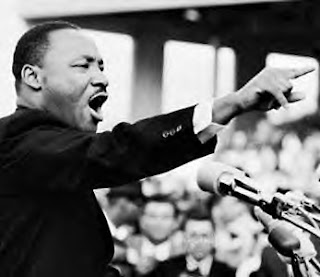
To ensure the importance and advancement of the Civil Rights Movement, Dr. Martin Luther King gave his most memorable speech to thousands in Washington D.C. in 1963. His message was of harmony but he did not want to quench the smoking flax that burned in the souls of the hearers; for this desire would allow them to press on. Although this speech is well recognized by all humans alike, there are still sections of this speech that if spoken today would be very controversial. Dr. King’s Dream has been twisted into a nightmare—a nightmare that
Dr. King was vastly interested in maintaining peace in the rallies and demonstrations either led by him or assembled elsewhere. “Let us not seek to satisfy our thirst for freedom by drinking from the cup of bitterness and hatred" (King). It was bitterness and hatred that kept the South’s attitude inhumane in the years following the Civil War. It was bitterness and hatred that burned in the souls of the students who tortured the Little Rock Nine. It was bitterness and hatred that Rosa Parks struggled through to sit in the front of the bus. Dr. King passionately wanted to show “his people” in a better light. Along with this, Dr. King states, “We must forever conduct our struggle on the high plane of dignity and discipline. We must not allow our creative protest to degenerate into physical violence.” If this were spoken today, the people of LA and
“I have a dream that my four children will one day live in a nation where they will not be judged by the color of their skin but by the content of their character.” In this statement, Dr. King provides the roots for racial equality. Being judged by the color of our skin is what every sensible American tries to avoid. Dr. King wanted his people to no longer live in a world where skin color mattered. Many would say that we’ve made great progress in this area of human society. However, are not Affirmative Action and quotas for employers simply programs that facilitate judging by the color of skin? Is not Federal funding for many “minority groups” for their cultural centers and clubs, judging by skin color? Is honoring one month of the year as “Black History Month,” not judging by skin color? Skin color is visible and well recognizable upon first glance. One’s character stems from their desire to be moral, decent, respectful, honest, trustworthy, diligent, with a good work ethic, etc. These characteristics are rarely observed at first glance because they are not visible to the eye, but visible to the hearts of those who encounter them. Judging by the content of a one’s character forces people to get to know each other and not to make hasty stereotypical assumptions.
This dream that Dr. King had was “deeply rooted in the American dream.” What is the American Dream? To understand the American Dream, one must understand the reasons for which
Dr. King was adamant to see the day when slave owners would sit down with slaves “together at a table of brotherhood.” To ensure that “all men are created equal,” Dr. King realized that racial titles are nothing more than racial barriers. To overcome this, his dream was that the once oppressed and once oppressors could live in harmony. I think Dr. King’s stomach would have churned if he witnessed the disharmony we see today. Many have fought for legislation to enact a plan of Reparations. These people feel that the descendents of slave owners today must repay a monetary amount to the ancestors of slaves. The fact is, Reparations have been paid. They’ve been paid by the many families risking their lives to help slaves escape through the Underground Railroad. They’ve been paid by the hundreds of thousands of dead Union soldiers. They’ve been paid by the passing of the 13th, 14th, and 15th Amendments in 1865. They’ve been paid through the large amount of funding for education. “Even Bill Clinton, who as president signed legislation that appropriated $150 million for study-abroad scholarships, endorsed an increase in the number and “diversity of students” who participate” (Drive Thru U). These students could be diverse in the sense of class or wealth. The quote almost hints that white-rich students are the only one’s participating, however since it is not defined, it is open for debate on its meaning. I’m not saying this funding was in result of Reparations but it is a special monetary gift given to these minorities. Alas, it was not enough. The greed that fuels the people fighting for Reparations has shadowed the sacrifices that have been made in history. These people think that by focusing on the past, their future will progress. The fact is however, that no one progresses if one is constantly regressing.
Dr. King’s aspirations have degenerated into a violent, apathetic Civil Rights Movement bent on minority supremacy rather than American supremacy. There is not a day that passes where someone feels the rebuke of racism—whether by slang derogatory words or the constant promotion of anti-American cultures through programs that define a culture or race outside of American. When Dr. King’s dream is lived as it was spoken, then and only then can we as humans say, “Free at last! Free at last! Thank God Almighty, we are free at last!”

No comments:
Post a Comment
Comments are this blog's property. Any comment deemed to be in poor taste will be removed.